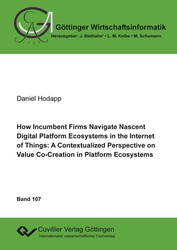| Areas | |
|---|---|
| Serie de libros (96) |
1381
|
| Nachhaltigkeit |
3
|
| Gesundheitswesen |
1
|
| Letra |
2370
|
| Medienwissenschaften | 16 |
| Teología | 57 |
| Filosofía | 102 |
| Derecho | 424 |
| Economía | 851 |
| Ciencias sociales | 418 |
| Ciencias del deporte | 48 |
| Psicología | 233 |
| Educación | 190 |
| Historia | 183 |
| Arte | 111 |
| Ciencias culturales | 166 |
| Literatur | 117 |
| Lingüística | 88 |
| Ciencias Naturales |
5408
|
| Ciencias Ingeniería |
1795
|
| General |
98
|
|
Leitlinien Unfallchirurgie
5. Auflage bestellen |
|
Erweiterte Suche
How Incumbent Firms Navigate Nascent Digital Platform Ecosystems in the Internet of Things: (Volumen 107) (Tienda española)
A Contextualized Perspective on Value Co-Creation in Platform Ecosystems
Daniel Hodapp (Autor)Previo
Lectura de prueba, PDF (210 KB)
Indice, PDF (120 KB)
This thesis is focusing on three little-explored contextual conditions that are important for a better understanding of digital platform ecosystems: digital platforms in a nascent stage of maturity, digital platforms built by incumbents, and digital platforms embedded in the IoT phenomenon. Thus, the thesis contributes to the question of how established companies navigating nascent digital platform ecosystems in the IoT. The work builds and contributes to the literature on digital platform ecosystems. Three main contributions are made through explorative qualitative research in the form of Delphi and case studies as well as through systematic literature research on the above-mentioned themes: First, the thesis synthesizes important knowledge about the nascent stage of digital platform ecosystems and identifies value co-creation challenges specific to this early maturity stage. Second, given the increasing importance of established companies in the platform discourse, this thesis identifies the intra- and inter-organizational challenges that incumbent organizations face in building digital platform ecosystems, emphasizing the importance of the organizational type in building a platform ecosystem. Third, the dissertation positions platforms in the IoT as a new digital platform instantiation within the scholarly platform discourse and outlines important phoneme-related characteristics that determine value creation.
| ISBN-13 (Impresion) | 9783736973626 |
| ISBN-13 (E-Book) | 9783736963627 |
| Formato | A5 |
| Idioma | Inglés |
| Numero de paginas | 240 |
| Laminacion de la cubierta | Brillante |
| Edicion | 1 |
| Serie | Göttinger Wirtschaftsinformatik |
| Volumen | 107 |
| Lugar de publicacion | Göttingen |
| Lugar de la disertacion | Göttingen |
| Fecha de publicacion | 17.02.2021 |
| Clasificacion simple | Tesis doctoral |
| Area |
Estadísticas y operación de investigaciones, Matemática para negocios
|
| Palabras claves | Internet, Internet of Things, IoT, Platforms, IoT Platforms, Digital Platform Ecosystems, Digital Platforms, Nascent Platform Ecosystems, Nascent Platforms, Multi-Sided Platform, Incumbent Organizations, Established Firms, Platform Firms, Digital Transformation, Platformization, Value Creation, Value Co-Creation, Cyber-Physical Value Creation, Network Effects, Network Externalities, Innovation, Cyber-Physical Innovation, Platform Competition, Maturity Stages, Platform Maturity Stages, Platform Lifecycle, Platform Evolution, Platform Sponsor, Platform Owner, Platform Context, Contextualized Platform Research, Digital Ecosystems, Digital Business Ecosystems, Interoperability, Fragmentation, Information Systems, Information System Research, Platform Building, Ecosystem Cultivation, Platform Economy, Internet, Internet der Dinge, IoT, Plattformen, IoT Plattformen, Digitale Plattform-Ökosysteme, Digitale Plattformen, Aufstrebende Plattform Ökosysteme, Aufstrebende Plattformen, Mehrseitige Plattform, Etablierte Organisationen, Etablierte Unternehmen, Plattform-Unternehmen, Digitale Transformation, Plattformisierung, Wertschöpfung, Wertschöpfungskooperation, Cyber-Physische Wertschöpfung, Netzwerkeffekte, Netzwerkexternalitäten, Innovation, Cyber-Physische Innovation, Plattform Wettbewerb, Reifegrade, Plattform Reifegrade, Plattform Lebenszyklus, Plattform Evolution, Plattform Sponsor, Plattform Eigentümer, Plattform Kontext, kontextualisierte Plattform Forschung, digitale Ökosysteme, digitale Business Ökosysteme, Interoperabilität, Fragmentierung, Informationssysteme, Informationssystem-Forschung, Plattformbildung, Ökosystem Kultivierung, Plattform-Ökonomie |








